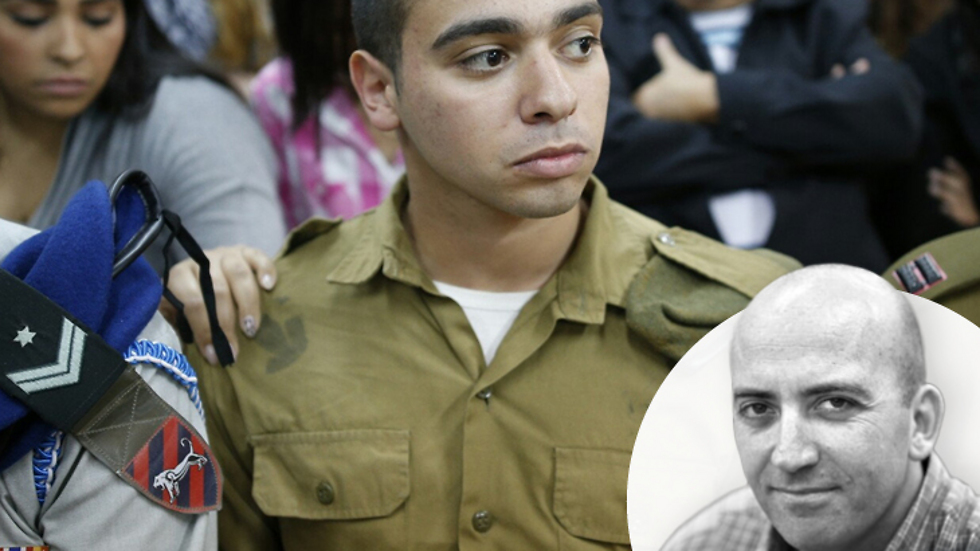
Tom Na'aman and Elor Azaria
צילום: מוטי קמחי
An army afraid to exercise its own discretion
Op-ed: Online abuse and shaming campaigns have rendered the IDF impotent to protect the commanders called to testify in the Azaria trial.
There's something worrying in the military prosecutor's request to forbid the publication of all the witnesses' names (and other identifying details) in the trial of Elor Azaria. The request came after the testimony of the company commander, Tom Na'aman, attracted a flood of abuse, curses, and threats. One of the online commentators wrote, "I wouldn't wish any soldier a loser company commander like that. If he were my company commander, for such a betrayal, he wouldn't be able to walk anymore."
None of this is unusual, unfortunately. Social media is full of invective, and shaming campaigns. When they're accompanied by threats of physical violence ("for such a betrayal, he wouldn't be able to walk anymore"), those who write them must be punished. Can the abusers and shamers be stopped? It's hard to believe that they can be. The internet has removed the gatekeepers.
It used to be, to spread one's poison to the masses, an enraged individual had to write a letter to the editor or publish an article; the newspaper editor, presumably, would throw screaming fits of letters into the trash. There were, of course, newspapers that supported slop, but they also had to play by the rules of the game, and, in any case, only reached a crowd who consumed sludge on a daily basis. The internet, however, allows publishing without (or nearly without) restrictions.
It's not that this verbal abuse didn't exist in the past. There were always persons who told their families and friends that they would "hang, burn, cut into pieces" the "traitor" whose opinion differs from theirs. Campaigns of shaming and verbal abuse also exist in non-digital social networks. (Think of the posters in ultra-Orthodox neighborhoods that shame members of their communities.)
However, in the not-distant past, this outrage would remain in closed circles. Potential commentators didn't have the huge audience that they do today. Now, they can have the wider public's attention, if only for 15 minutes.
So long as social media exists, there will also be threats and verbal abuse. That's not what worries me at the moment. What worries me in the application to hide the identities of witnesses in the Azaria case is that a powerful entity like the Israeli army feels that it doesn't have the ability to provide its people the minimum of protection that they need, that it needs a witness-protection program, because the forces opposing it make it feel helpless.
The sole organization with a consensus across ideological lines in Israeli society, the entity defined (problematically) in familial terms—the soldiers are everyone's children—doesn't feel safe when one of its commanders dares to cross a certain political line. Past experience has taught that in the camp of traitor-hunters, Azaria's not the only one with a quick trigger finger. The army is afraid.
It's important to remember what's to come. The commanders testifying for the prosecution in the trial are not "left-wing activists," but rather responsible adults, those into whose hands the fates of everyone's children are entrusted. They aren't from Breaking the Silence, but rather "the boy's" commander who work day and night on the holy work of the occupation, without questioning and without refusing. The witnesses in Azaria's trial are theoretically those that society expects to exercise their judgment and decide on condemnations or citations.
To a great extent, the public debate surrounding Azaria's conduct is not a debate about Arabs or the occupation, but rather a debate on the IDF chain of command. But it turns out that the legitimacy for commanders' discretion in the IDF is limited to one side only. "Unconditional" backup is given to those who wear a uniform on a condition: Whoever shoots Arabs, under any circumstances, is entitled to unqualified support. They're innocent. Whoever doesn't shoot, or even worse, condemns the shooters, is "a nothing" who "shouldn't be able to walk anymore." The army, in other words, has a license to kill. It's not sure if it has a license to prevent killing.
What will happen if the IDF tries to exercise its command discretion against the principle of "the shooters are innocent"? The current prime minister and minister of defense have made their positions clear. The previous minister of defense also made his position clear. The IDF has learned its lesson: There are cases where the endangered person is not the defendant, but the prosecution.











